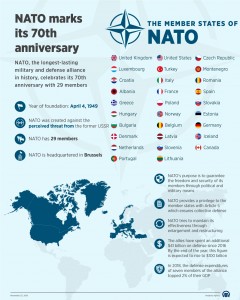Nato at 70
The moment of crisis has arrived
Magazine Desk
It was meant to be a celebration of the 70th anniversary of NATO. But the mood at a gathering of the alliance’s leaders this week in London was anything but celebratory. There was no disguising the fact that NATO is in deep — even existential — trouble. Nothing illustrated this unease more than the brief elation among NATO hands over Donald Trump’s surprising defence of the alliance. If the American president, previously a NATO-sceptic, had had a change of heart, perhaps things were not so dire after all. Except Trump hadn’t had a change of heart. His defense of the alliance was little more than a rhetorical stick with which to beat French President Emmanuel Macron, who had previously bemoaned the institution’s “brain death.” Credit must also go to NATO Secretary General Jens Stoltenberg, who has done a masterful job of managing Trump, calming the president’s tantrums and stroking his ego.
Amid all the glad-handing at the various receptions held in London to mark Nato’s 70th anniversary, it is the deep divisions that exist between the alliance’s 29 member-states that have dominated the agenda.
In contrast to previous summits, where Donald Trump complained that Washington’s European partners were not paying their fair share towards Nato’s running costs, the American president instead used his appearance at this week’s jamboree to turn his guns on French President Emmanuel Macron, whom he accused of being “nasty” for his recent suggestion that Nato was “brain dead”.
There was a time not so long ago when there was serious concern in London that the energetic young French leader would persuade Washington that France might be a better bet than Britain in being America’s principal staging post in Europe. This was after Macron had flattered the US leader by inviting him to Paris for the annual July 14 Bastille Day celebrations in 2017.
Edge of a precipice
Relations between the two leaders, though, have deteriorated sharply since then, to the extent that Macron now believes that Europe stands on “the edge of a precipice” because it can no longer rely on Washington to defend its Nato allies.
From Washington’s perspective, Macron’s criticism is a bit rich given that the main reason American policymakers are asking whether it remains in the US’s interests to continue supporting Nato is that far too many European countries refuse to meet the basic defence spending requirement of 2 per cent of gross domestic product.
France is one of the few European states that does meet its spending commitments, but that did not stop Trump from attacking the French president, claiming that “nobody needs Nato more than France … the US benefits the least”.
Trump’s blunt criticism is symptomatic of a deeper rift that has developed between the two leaders over trade issues, with the White House threatening to impose crippling tariffs if Macron presses ahead with a digital services tax, which Washington believes would unfairly penalise large American tech companies such as Facebook and Google.
So far as the future of the Nato alliance is concerned, though, the criticisms voiced by both leaders are valid. Yes, it remains the case that too many European states are failing to meet their spending commitments. And it is also true that concerns about American reliability risk plunging the alliance into the kind of existential crisis to which Macron is referring.
Trump’s frustration with the likes of Germany, Italy and Spain over defence spending has become a recurring theme of his presidency, to the extent that, at a heated meeting of Nato leaders in Brussels in July 2018, he shocked the other participants by openly discussing America’s withdrawal from the alliance.
Real impact
This threat appears to have receded — for the moment anyway — not least because, as Nato secretary general Jens Stoltenberg explained, Canada and some European states have added an extra pounds 100 billion to Nato’s defence budget, a figure that should more than triple by 2024, a remarkable change. Stoltenberg, moreover, credited Trump with showing “leadership on defence spending” that was having a real impact.
Thus, far from turning his back on the alliance, Trump may well prove to be Nato’s financial saviour.
If significant progress has been made in repairing Nato’s finances, the same cannot be said for the divisions that exist about its future direction of travel, as well as how reliable an ally Trump might prove to be in any crisis.
Much of the concern among European leaders about Washington’s reliability stems from Trump’s abandonment of the Syrian Kurds, the West’s erstwhile allies in the war against Daesh, in October. If Trump can behave in this manner towards those who have fought and died on America’s behalf, then what is to prevent him turning his back on European allies?
Nor is European disquiet about Trump’s intentions helped by the conflicting signals the president has given out over his dealings with Turkey and Russia.
It is highly likely that Turkey would be facing punitive measures from Nato over its decision to purchase Russia’s S-400 anti-aircraft missile system were it not for the close personal relationship Trump enjoys with Turkish President Recep Tayyip Erdogan. Similarly, Trump’s desire to maintain friendly terms with Russian President Vladimir Putin undermines Nato’s claims that Russia poses a grave threat to its security.
What Trump needs to understand is that any sign of discord within the western alliance only plays into the hands of long-standing foes like Russia, which would like nothing more than Nato’s demise.
The answer, therefore, is for the US and its European allies to rediscover the sense of resolve and unity of purpose that enabled the western powers to emerge triumphant in the Cold War.
 Jahangir's World Times First Comprehensive Magazine for students/teachers of competitive exams and general readers as well.
Jahangir's World Times First Comprehensive Magazine for students/teachers of competitive exams and general readers as well.





